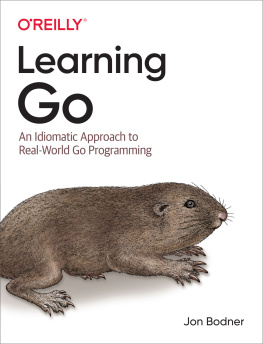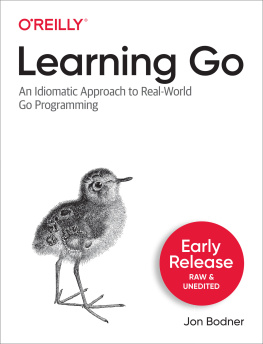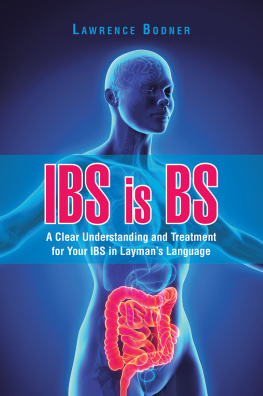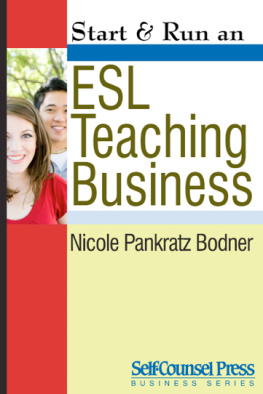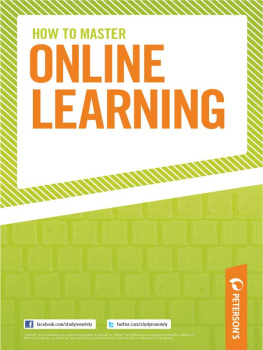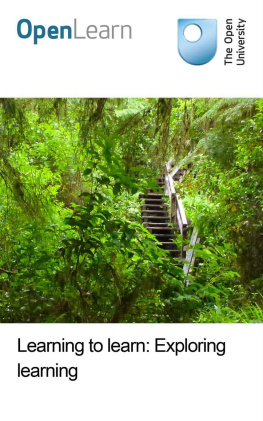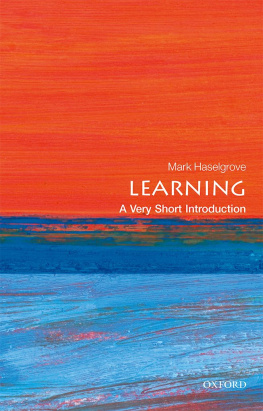Jon Bodner - Learning Go
Here you can read online Jon Bodner - Learning Go full text of the book (entire story) in english for free. Download pdf and epub, get meaning, cover and reviews about this ebook. year: 2021, publisher: OReilly Media, Inc., genre: Computer. Description of the work, (preface) as well as reviews are available. Best literature library LitArk.com created for fans of good reading and offers a wide selection of genres:
Romance novel
Science fiction
Adventure
Detective
Science
History
Home and family
Prose
Art
Politics
Computer
Non-fiction
Religion
Business
Children
Humor
Choose a favorite category and find really read worthwhile books. Enjoy immersion in the world of imagination, feel the emotions of the characters or learn something new for yourself, make an fascinating discovery.
- Book:Learning Go
- Author:
- Publisher:OReilly Media, Inc.
- Genre:
- Year:2021
- Rating:4 / 5
- Favourites:Add to favourites
- Your mark:
- 80
- 1
- 2
- 3
- 4
- 5
Learning Go: summary, description and annotation
We offer to read an annotation, description, summary or preface (depends on what the author of the book "Learning Go" wrote himself). If you haven't found the necessary information about the book — write in the comments, we will try to find it.
Learning Go — read online for free the complete book (whole text) full work
Below is the text of the book, divided by pages. System saving the place of the last page read, allows you to conveniently read the book "Learning Go" online for free, without having to search again every time where you left off. Put a bookmark, and you can go to the page where you finished reading at any time.
Font size:
Interval:
Bookmark:

Go is unique and even experienced programmers have to unlearn a few things and think differently about software. Learning Go does a good job of working through the big features of the language while pointing out idiomatic code, pitfalls, and design patterns along the way.
Aaron Schlesinger, Sr. Engineer, Microsoft
Jon has been a critical voice in the Go community for many years and we have been strongly benefitted from his talks and articles. With Learning Go, Jon has written the programmers guide to learning Go. It strikes just the right balance of giving a good overview of what you need to know without rehashing well understood concepts from other languages.
Steve Francia, Go language product lead, Google, and author of Hugo, Cobra, and Viper
Bodner gets Go. In clear, lively prose, he teaches the language from its basics to advanced topics like reflection and C interop. He demonstrates through numerous examples how to write idiomatic Go, with its emphasis on clarity and simplicity. He also takes the time to explain the underlying concepts that can affect your programs behavior, like the effects of pointers on memory layout and garbage collection. Beginners who read this book will come up to speed quickly, and even experienced Go programmers are likely to learn something. "
Jonathan Amsterdam, Software Engineer on the Go team at Google
"Learning Go is the essential introduction to what makes the Go programming language unique as well as the design patterns and idioms that make it so powerful. Jon Bodner manages to connect the fundamentals of the language to Gos philosophy, guiding readers to write Go the way it was meant to be written.
Robert Liebowitz, Software Engineer at Morning Consult
Jon wrote a book that does more than just reference Go; it provides an idiomatic and practical understanding of the language. Jons industry experience is what drives this book, and it will help those looking to be immediately productive in the language.
William Kennedy, Managing Partner at Ardan Labs
by Jon Bodner
Copyright 2021 Jon Bodner. All rights reserved.
Printed in the United States of America.
Published by OReilly Media, Inc., 1005 Gravenstein Highway North, Sebastopol, CA 95472.
OReilly books may be purchased for educational, business, or sales promotional use. Online editions are also available for most titles (http://oreilly.com). For more information, contact our corporate/institutional sales department: 800-998-9938 or corporate@oreilly.com .
- Acquisitions Editor: Suzanne McQuade
- Developmental Editor: Michele Cronin
- Production Editor: Beth Kelly
- Copyeditor: Piper Editorial Consulting, LLC
- Proofreader: Piper Editorial Consulting, LLC
- Indexer: Judith McConville
- Interior Designer: David Futato
- Cover Designer: Karen Montgomery
- Illustrator: Kate Dullea
- March 2021: First Edition
- 2021-03-02: First Release
- 2021-05-14: Second Release
See http://oreilly.com/catalog/errata.csp?isbn=9781492077213 for release details.
The OReilly logo is a registered trademark of OReilly Media, Inc. Learning Go, the cover image, and related trade dress are trademarks of OReilly Media, Inc.
The views expressed in this work are those of the author, and do not represent the publishers views. While the publisher and the author have used good faith efforts to ensure that the information and instructions contained in this work are accurate, the publisher and the author disclaim all responsibility for errors or omissions, including without limitation responsibility for damages resulting from the use of or reliance on this work. Use of the information and instructions contained in this work is at your own risk. If any code samples or other technology this work contains or describes is subject to open source licenses or the intellectual property rights of others, it is your responsibility to ensure that your use thereof complies with such licenses and/or rights.
978-1-492-07721-3
[LSI]
My first choice for a book title was Boring Go because, properly written, Go is boring.
It might seem a bit weird to write a book on a boring topic, so I should explain. Go has a small feature set that is out of step with most other modern programming languages. Well-written Go programs tend to be straightforward and sometimes a bit repetitive. Theres no inheritance, no generics (yet), no aspect-oriented programming, no function overloading, and certainly no operator overloading. Theres no pattern matching, no named parameters, no exceptions. To the horror of many, there are pointers. Gos concurrency model is unlike other languages, but its based on ideas from the 1970s, as is the algorithm used for its garbage collector. In short, Go feels like a throwback. And thats the point.
Boring does not mean trivial. Using Go correctly requires an understanding of how its features are intended to fit together. While you can write Go code that looks like Java or Python, youre going to be unhappy with the result and wonder what all the fuss is about. Thats where this book comes in. It walks through the features of Go, explaining how to best use them to write idiomatic code that can grow.
When it comes to building things that last, being boring is great. No one wants to be the first person to drive their car over a bridge built with untested techniques that the engineer thought were cool. The modern world depends on software as much as it depends on bridges, perhaps more so. Yet many programming languages add features without thinking about their impact on the maintainability of the codebase. Go is intended for building programs that last, programs that are modified by dozens of developers over dozens of years.
Go is boring and thats fantastic. I hope this book teaches you how to build exciting projects with boring code.
This book is targeted at developers who are looking to pick up a second (or fifth) language. The focus is on people who are new to Go. This ranges from those who dont know anything about Go other than it has a cute mascot, to those who have already worked through a Go tutorial or even written some Go code. The focus for Learning Go isnt just how to write programs in Go; its how to write Go idiomatically. More experienced Go developers can find advice on how to best use the newer features of the language. The most important thing is that the reader wants to learn how to write Go code that looks like Go.
Experience is assumed with the tools of the developer trade, such as version control (preferably Git) and IDEs. Readers should be familiar with basic computer science concepts like concurrency and abstraction, as the book explains how they work in Go. Some of the code examples are downloadable from GitHub and dozens more can be tried out online on The Go Playground. While an internet connection isnt required, it is helpful when reviewing executable examples. Since Go is often used to build and call HTTP servers, some examples assume familiarity with basic HTTP concepts.
While most of Gos features are found in other languages, Go makes different tradeoffs, so programs written in it have a different structure. Learning Go starts by looking at how to set up a Go development environment, and then covers variables, types, control structures, and functions. If you are tempted to skip over this material, resist the urge and take a look. It is often the details that make your Go code idiomatic. Some of what seems obvious at first glance might actually be subtly surprising when you think about it in depth.
Font size:
Interval:
Bookmark:
Similar books «Learning Go»
Look at similar books to Learning Go. We have selected literature similar in name and meaning in the hope of providing readers with more options to find new, interesting, not yet read works.
Discussion, reviews of the book Learning Go and just readers' own opinions. Leave your comments, write what you think about the work, its meaning or the main characters. Specify what exactly you liked and what you didn't like, and why you think so.

